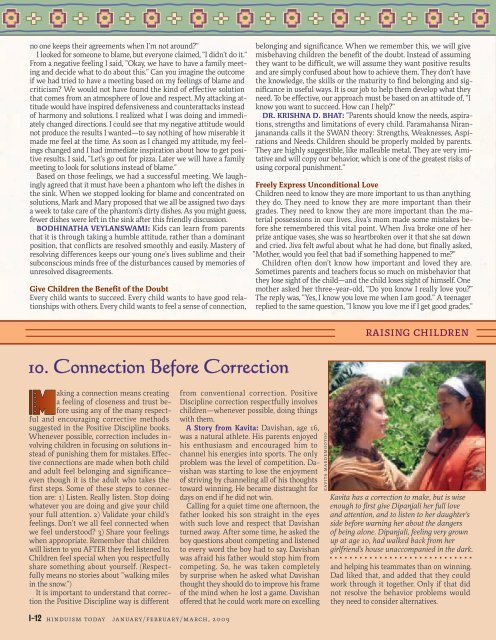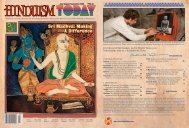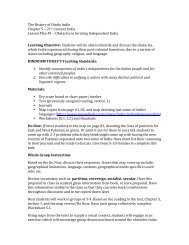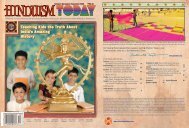Hinduism Today January 2009 - Cover, Index, Front Articles
Hinduism Today January 2009 - Cover, Index, Front Articles
Hinduism Today January 2009 - Cover, Index, Front Articles
You also want an ePaper? Increase the reach of your titles
YUMPU automatically turns print PDFs into web optimized ePapers that Google loves.
no one keeps their agreements when I’m not around?”I looked for someone to blame, but everyone claimed, “I didn’t do it.”From a negative feeling I said, “Okay, we have to have a family meetingand decide what to do about this.” Can you imagine the outcomeif we had tried to have a meeting based on my feelings of blame andcriticism? We would not have found the kind of effective solutionthat comes from an atmosphere of love and respect. My attacking attitudewould have inspired defensiveness and counterattacks insteadof harmony and solutions. I realized what I was doing and immediatelychanged directions. I could see that my negative attitude wouldnot produce the results I wanted—to say nothing of how miserable itmade me feel at the time. As soon as I changed my attitude, my feelingschanged and I had immediate inspiration about how to get positiveresults. I said, “Let’s go out for pizza. Later we will have a familymeeting to look for solutions instead of blame.”Based on those feelings, we had a successful meeting. We laughinglyagreed that it must have been a phantom who left the dishes inthe sink. When we stopped looking for blame and concentrated onsolutions, Mark and Mary proposed that we all be assigned two daysa week to take care of the phantom’s dirty dishes. As you might guess,fewer dishes were left in the sink after this friendly discussion.Bodhinatha veylanswami: Kids can learn from parentsthat it is through taking a humble attitude, rather than a dominantposition, that conflicts are resolved smoothly and easily. Mastery ofresolving differences keeps our young one’s lives sublime and theirsubconscious minds free of the disturbances caused by memories ofunresolved disagreements.Give Children the Benefit of the DoubtEvery child wants to succeed. Every child wants to have good relationshipswith others. Every child wants to feel a sense of connection,belonging and significance. When we remember this, we will givemisbehaving children the benefit of the doubt. Instead of assumingthey want to be difficult, we will assume they want positive resultsand are simply confused about how to achieve them. They don’t havethe knowledge, the skills or the maturity to find belonging and significancein useful ways. It is our job to help them develop what theyneed. To be effective, our approach must be based on an attitude of, “Iknow you want to succeed. How can I help?”Dr. Krishna D. Bhat: “Parents should know the needs, aspirations,strengths and limitations of every child. Paramahansa Niranjananandacalls it the SWAN theory: Strengths, Weaknesses, Aspirationsand Needs. Children should be properly molded by parents.They are highly suggestible, like malleable metal. They are very imitativeand will copy our behavior, which is one of the greatest risks ofusing corporal punishment.”Freely Express Unconditional LoveChildren need to know they are more important to us than anythingthey do. They need to know they are more important than theirgrades. They need to know they are more important than the materialpossessions in our lives. Jiva’s mom made some mistakes beforeshe remembered this vital point. When Jiva broke one of herprize antique vases, she was so heartbroken over it that she sat downand cried. Jiva felt awful about what he had done, but finally asked,“Mother, would you feel that bad if something happened to me?”Children often don’t know how important and loved they are.Sometimes parents and teachers focus so much on misbehavior thatthey lose sight of the child—and the child loses sight of himself. Onemother asked her three‐year‐old, “Do you know I really love you?”The reply was, “Yes, I know you love me when I am good.” A teenagerreplied to the same question, “I know you love me if I get good grades.”dinodiaThe Teen YearsWhen children reach their teens, they naturallygo through a major individuation process. Theyare exploring who they are, separate from theirparents. This often translates into rebellion asthey test parental values.Peer pressure is extremely important toteenagers. Younger children are influenced bypeer pressure, but adult approval is even moreimportant to them. To teenagers, peer approvaltrumps adult approval.Many parents and teenagers have drawnbattle lines, which is intensified when parentsare intent on controlling their teenagers. We aresaddened by this, because we know it is absolutelyimpossible to control teenagers; it is too late. Themore you try to control them, the more defiantand/or devious they get.The best way to win the cooperation ofteenagers is through mutual respect and equalityin problem solving. Family meetings and classmeetings teach social responsibility and get theminvolved in the decision‐making process.When treated with kindness, firmness, dignity,respect and lots of joint problem-solving,teenagers usually fall back on parental values intheir twenties—and they will have learned more ofthe important life skills they need when they areno longer under the authority of adults.10. Connection Before CorrectionMaking a connection means creatinga feeling of closeness and trust beforeusing any of the many respectfuland encouraging corrective methodssuggested in the Positive Discipline books.Whenever possible, correction includes involvingchildren in focusing on solutions insteadof punishing them for mistakes. Effectiveconnections are made when both childand adult feel belonging and significance–even though it is the adult who takes thefirst steps. Some of these steps to connectionare: 1) Listen. Really listen. Stop doingwhatever you are doing and give your childyour full attention. 2) Validate your child’sfeelings. Don’t we all feel connected whenwe feel understood? 3) Share your feelingswhen appropriate. Remember that childrenwill listen to you AFTER they feel listened to.Children feel special when you respectfullyshare something about yourself. (Respectfullymeans no stories about “walking milesin the snow.”)It is important to understand that correctionthe Positive Discipline way is differentfrom conventional correction. PositiveDiscipline correction respectfully involveschildren—whenever possible, doing thingswith them.A Story from Kavita: Davishan, age 16,was a natural athlete. His parents enjoyedhis enthusiasm and encouraged him tochannel his energies into sports. The onlyproblem was the level of competition. Davishanwas starting to lose the enjoymentof striving by channeling all of his thoughtstoward winning. He became distraught fordays on end if he did not win.Calling for a quiet time one afternoon, thefather looked his son straight in the eyeswith such love and respect that Davishanturned away. After some time, he asked theboy questions about competing and listenedto every word the boy had to say. Davishanwas afraid his father would stop him fromcompeting. So, he was taken completelyby surprise when he asked what Davishanthought they should do to improve his frameof the mind when he lost a game. Davishanoffered that he could work more on excellingkavita mardemootooraising childrenKavita has a correction to make, but is wiseenough to first give Dipanjali her full loveand attention, and to listen to her daughter’sside before warning her about the dangersof being alone. Dipanjali, feeling very grownup at age 10, had walked back from hergirlfriend’s house unaccompanied in the dark.and helping his teammates than on winning.Dad liked that, and added that they couldwork through it together. Only if that didnot resolve the behavior problems wouldthey need to consider alternatives.14 strategies parents need to know11. Ask Curiosity QuestionsToo often adults tell children what happened,what caused it to happen, howthe child should feel about it, what thechild should learn from it, and what the childshould do about it. It is much more respectfuland encouraging when we ask what happened,what the child thinks caused it, how the childfeels about it, what the child has learned, whatideas the child has to solve the problem, or howthe child can use what she has learned in thefuture. This is the true meaning of education,which comes from the Latin word educare,which means “to draw forth.” Too often, adultstry to “stuff in,” instead of draw forth, and thenwonder why children don’t learn.One way to get the child engaged is to askquestions that arouse their curiosity. A few typicalcuriosity questions are:• What were you trying to accomplish?• How do you feel about what happened?• What did you learn from this?• How can you use what youlearned in the future?• What ideas do you have for solutions now?A Story from Jane: One of my favoriteexamples is the time my daughter sharedwith me her intention to get drunk at aparty. I gulped and said, “Tell me more.Why are you thinking of doing that?” Shesaid, “Lots of kids do it and it looks likethey are having fun.” I stifled my temptationto lecture and asked, “What do yourfriends say about you now, knowing youdon’t drink?” She thought about this andsaid, “They are always telling me howmuch they admire me and how proudthey are of me.” I continued, “What willthey think after you get drunk?” I couldsee her think before she offered, “I’ll betthey’ll be disappointed.” I followed with,“How do you think you’ll feel about yourself.”I could tell this question made herthink a little deeper. She paused a littlelonger before saying, “I will probably feellike a loser.” This was soon followed by,“You know, Mom, I don’t need to get drunk.Thank you for taking the time to help mewith this.”dinodiaAsking the right questions about asensitive issue can bring mother anddaughter closer together. It is good toremember that a child’s relationshipwith the parents can profoundly affecthis or her decision-making patterns.I-12 hinduism today january/february/march, <strong>2009</strong> january/february/march, <strong>2009</strong> hinduism today I-13
















